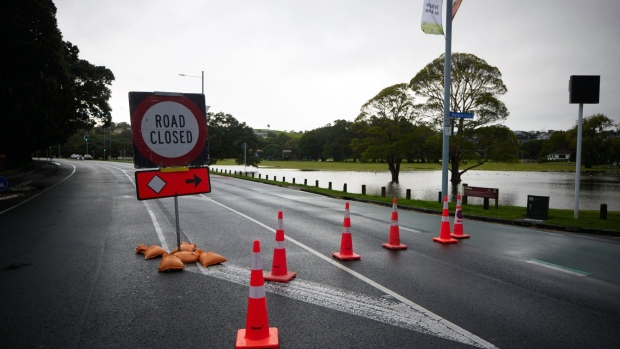Feb 14, 2023
New Zealand in Rescue Mode After Cyclone Gabrielle Displaces Thousands
, Bloomberg News

(Bloomberg) -- Four people are dead and there are concerns for others who are missing on New Zealand’s North Island as emergency services struggle to reach isolated communities in the aftermath of Cyclone Gabrielle.
The dead include a young person caught in rising water and a firefighter trapped in a landslide west of Auckland, New Zealand Police said Wednesday in Wellington. More than 1,400 people are uncontactable and there are “several” missing for whom police have grave concerns.
At least 10,500 people have been forced from their homes and some towns are cut off after surging rivers damaged bridges and roads were blocked by floods and landslips. An estimated 160,000 households remain without power.
“Our immediate focus has been undertaking life-saving missions for those affected by the floods who needed to be rescued, getting telecommunications and power back on as quickly as possible and conducting aerial surveys to understand the extent of the damage,” Prime Minister Chris Hipkins told reporters. “This has been an enormous logistical effort.”
While Gabrielle has now moved off New Zealand’s east coast, it has left a trail of destruction of infrastructure and property that will take a long time to repair. The government yesterday declared a national state of emergency for just the third time in the country’s history, with Hipkins saying the cyclone is the most significant weather event New Zealand has witnessed this century.
The defence force is bringing in more personnel to assist with evacuations as several areas remain under threat from rising rivers.
Air force helicopters and a fleet of army vehicles have been deployed to rescue people, including airlifting several from rooftops surrounded by floodwaters. A navy ship will be arrive in Napier Thursday with emergency supplies and another will be deployed.
Electricity companies are working to restore power, grid operator Transpower said Wednesday.
The power outages severely disrupted cellular and fiber optic communications, leaving many communities contactable only by satellite phone. Some areas face shortages of food, water and other essentials, with residents urged to conserve where possible.
“Everyone knows we have a long path ahead of us as we deal with extensive damage to homes, businesses, roads and bridges and other fundamental parts of our infrastructure,” Emergency Management Minister Kieran McAnulty said earlier. “This is a significant disaster and it is going to take many weeks for those areas most affected to recover.”
The severity of the cyclone’s impact prompted the nation’s climate change minister to upbraid politicians for a lack of action on the warming planet.
“I struggle to find words to express what I am thinking and feeling about this particular crisis,” James Shaw, who is also co-leader of the Green Party, told parliament on Tuesday. “We need to stop making excuses for inaction. We cannot put our heads in the sand when the beach is flooding. We must act now.”
(Updates with prime minister’s comments)
©2023 Bloomberg L.P.





